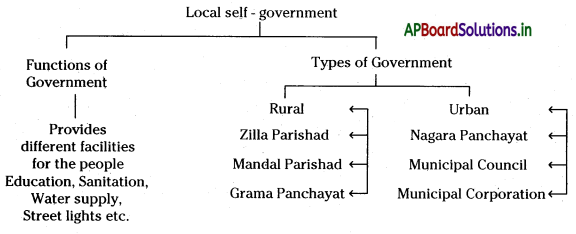Students can go through AP State Board 6th Class Social Studies Notes Chapter 10 Local Self-Government to understand and remember the concept easily.
AP State Board Syllabus 6th Class Social Studies Notes Chapter 10 Local Self-Government
→ Local self-government in India refers to governmental jurisdictions below the level of the state.
→ Andhra Pradesh Panchayat Raj Act 1994 established three-tier local self-governments in rural areas. They are Grama Panchayat at the village level, Mandal Praja Parishad at the Mandal level, and Zilla Praja Parishad at the District level.
→ The ‘Grama sabha’ is the general body at the village level. It consists of all the voters in a village. It is presided over by the President / Sarpanch of the village.
→ Grama Panchayat is formed with Sarpanch and Ward Members. It is formed through elections. It is presided over by the President or Sarpanch of the village.
→ A village is usually divided into wards and each ward elects one member to the village panchayat, called ‘ward member’. A person who is twenty-one years age or above can contest the election.’
→ Panchayat functions as representative institutions of all people in the rural and tribal areas.
→ Ward members and the Sarpanch will be elected in elections. The person who gets the maximum votes is declared to be elected. Sarpanch is the head of the gram panchayat and he implements all the decisions of the panchayat and looks after the day-to-day functions of the panchayat.
→ Sarpanch and ward members elect one of the ward members as the deputy or up a Sarpanch through the indirect election. The UpaSarpanch acts in the absence of the Sarpanch.
→ The system of Grama Sachivalayam was started on October 2nd, 2019 in our state. There are eleven Village Secretariat functionaries (employees) in every Grama Sachivalayam.
→ About 20-40 Gram Panchayats come under a Maifdal Parishad. All the Mandal Parishad in the district come under the Zilla Parishad. The members of the Mandal Parishad are elected directly by the voters. Some members of Mandal Parishad are nominated The MPTCs elect one member among them as Mandal President and one as vice president through the indirect election.
![]()
→ The Zilla Parishad members are elected from Zilla Parishad by voters directly. Some members of Zilla Parishad are nominated. The ZPTCs elect one member among them as Zilla Parishad Chairman and one as vice-chairman through the indirect election. The Zilla Parishad and the Mandal Parishad coordinate the activities of the Panchayats in the district and the Mandal, approve their plans, and allocate the funds.
→ Nagar Panchayat has a committee consisting of a chairman with ward councilors. The councilors or ward members are chosen by direct election from electoral wards in the Nagar Panchayat.
→ The municipality has a Municipal council with elected members who are known as “councilors” and nominated members. The ward councilors are elected directly every five years. These councilors and the other members of the council together choose the Municipal Chairman indirectly.
→ Municipal Corporation consists of elected members known as “Corporators” and nominated members. These Corporators and the other members of the Corporation together choose the Mayor of Municipal Corporation indirectly.
→ Local self-government: Governmental jurisdictions below the level of the state.
→ Grama Sabha: General body in a Grama Panchayat.
→ Grama/Ward Sachivalayam: The system, to provide all government services to the people in their locality.
→ Village functionaries: The employees in the Grama Sachivalayam.
→ Public Amenities: The facilities provided by the government.
→ Municipal Council: The governing body in a municipality
![]()
→ Municipal Corporation: The governing body in a municipal corporation.
→ Councilor: Ward representative in Municipal council.
→ Corporate: Ward representative in Municipal Corporation.
